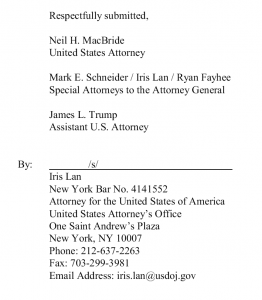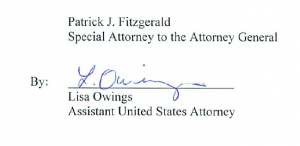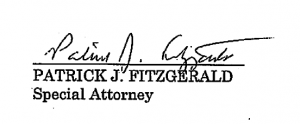Selective Prosecution from CIA’s US Attorney
In its response to John Kiriakou’s claim he is being selectively prosecuted, the government cites this passage from US v. Armstrong.
A selective prosecution claim asks a court to exercise judicial power over a special province of the Executive. The Attorney General and United States Attorneys retain broad discretion to enforce the Nation’s criminal laws . . . . As a result, [t]he presumption of regularity supports their prosecutorial decisions and, in the absence of clear evidence to the contrary, courts presume that they have properly discharged their official duties. In the ordinary case, so long as the prosecutor has probable cause to believe that the accused committed an offense defined by statute, the decision whether or not to prosecute, and what charge to file or bring before a grand jury, generally rests entirely in his discretion. [my emphasis]
It then describes the standard for presumption of regularity by citing David Passaro’s unsuccessful appeal.
Kiriakou seeks to overturn the presumption of regularity by asserting that the decision to charge him must have arisen from some illegitimate prosecutorial motive, rather than the investigation having followed the facts where they led. However, the defendant fails to offer clear evidence to support his claim, and falls far short of satisfying the high burden required to overcome the presumption of regularity. See United States v. Passero, 577 F.3d 207, 219 (4th Cir. 2009) (“[u]nless a defendant provides ‘clear evidence’ to overcome the presumption that a government prosecutor has acted lawfully and without discrimination-a ‘particularly demanding’ standard-he cannot demonstrate a constitutional violation for selective prosecution.” (citation omitted)). [original spelling error for “Passaro” highlighted]
The entire filing is signed this way:
Compare that signature with this one, from before Kiriakou was indicted.
Or this signature, from the indictment itself.
Monday’s response to Kiriakou’s selective prosecution motion is the first submitted after Patrick Fitzgerald’s last day on Friday. If I’m not mistaken, it is the first filing submitted after the guy selected for his independence from the CIA’s witch hunt on torture departed government. It is, AFAIK, the first public hint at what the new investigative reporting structure and team looks like (which appears to have completely changed, even beyond Fitzgerald’s departure).
And the filing shows that, rather have the prosecution led by a US Attorney assigned as a Special Attorney reporting directly to the Attorney General, the prosecution now includes Neil MacBride, US Attorney for Eastern District of VA. And while the designation of AUSAs Schneider, Lan, and Fayhee as Special Attorneys suggests some kind of special reporting structure (Lan, at least, is in SDNY, not EDVA), the filing shows that the CIA’s US Attorney, the US Attorney’s office for EDVA, now has a role in the prosecution.
Which brings me to the problem with the government’s citations on selective prosecution.
For better or worse, it would be difficult for John Kiriakou to prove that Patrick Fitzgerald, the guy who once indicted the Vice President’s Chief of Staff for obstruction into an investigation into whether he leaked a CIA officer’s covert identity, selectively prosecuted him for leaking a CIA officer’s covert identity. After all, Fitzgerald was willing to go after one of the most senior national security officials in the country for precisely this alleged crime; going after Kiriakou (and indicting him for the lies told over the course of that investigation) would be consistent with that history.
But to prove that the US Attorney for Eastern District of VA is not entitled to the presumption of regularity on a prosecution involving our nation’s torturers? Kiriakou need only point to the USA EDVA’s (then held by Paul McNulty) decision not to prosecute the Salt Pit murder–by some of Covert Officer A and Deuce Martinez’ colleagues–of Gul Rahman to show that the USA Attorney for EDVA in fact should not be entitled to the presumption of regularity. On the contrary, EDVA has already affirmatively covered up the torture crimes of the CIA.
And Kiriakou’s job is made easier still with the reference to David Passaro’s appeal. Passaro was the only CIA person (he was a contractor training Afghan paramilitaries) to be prosecuted in relation to abusive interrogation. But he would never have been prosecuted if it weren’t for the government’s blatant failure to provide him with discovery of a bunch of documents that would have shown the techniques he used on Ahmed Wali were approved by the CIA Director, acting pursuant to the President’s authorization. In other words, Passaro’s entire prosecution was built around prosecutorial abuse that served to hide that they were prosecuting the wrong guy–the guy who followed orders allowing abuse rather than the high level officials who authorized that abuse.
And I’m sure, under the watchful eyes of the CIA’s own US Attorney, this case will continue along those same lines, with prosecutorial abuse designed to hide the long-term criminal cover-up of the CIA’s torture.





It looks like Mark E. Schneider is an Assistant U.S. Attorney in Chicago if these links are correct (here and here – 6 page PDF), so is he somehow the Chicago substitute for Fitzgerald’s departure?
Ryan Fayhee appears to be a trial attorney “of the Counterespionage Section in the Justice Department’s National Security Division” according to this PDF (2 pages)
… -> Linda Green.
Perfected.
@MadDog: Granted that the original matter that resulted in the charges against Kiriakou had their inception in an investigation regarding “the discovery of photographs of CIA and other sensitive government personnel in the cells of high-value detainees at Guantanamo Bay”, which appears to be where “the Counterespionage Section in the Justice Department’s National Security Division” became involved, why is Ryan Fayhee still involved in Kiriakou’s prosecution on an entirely different matter?
Sorry for the off topic but I wanted to throw this link out here from the DangerRoom. You might have seen it already, but I am sitting here, slack jawed. The other obvious solutions to this “leaking” problem does not even seem to occur to this government…
Feds Look to Fight Leaks With ‘Fog of Disinformation’
More OT – Via UPI:
@MadDog: Saw it. 30,000 is … a lot of people. That said, it’s the same old Mustafa Alani story about how great the Saudis are.
@emptywheel: Yeah, it is a big number. I’m guessing most are low-level informants at best, and more likely, stipend recipients reporting open-source local gossip.
As to Alani, he is no doubt a Saudi cheerleader and it wouldn’t surprise me if he was on their payroll too. I note that he is careful never to discuss Saudi machinations involving Yemeni government officials and other Yemeni power players. Like how Yemen is a Saudi client state much like Bahrain.
Agree with everything in the post, except for one point. MacBride et. al don’t have to demonstrate non-selectivity, they are of course cloaked by Fitzgerald having made the [supposedly] discretionary charging decision. Not to mention, and I just hate this, but even if MacBride and EDVA were the charging authority, there is effectively no way it would not still hold up to a selective claim. They are pretty much impossible to make out on normal cases, but in the NatSec area, I am hard pressed to envision it would ever be granted. There effectively no such thing as “selective prosecution” in this day and age; all of which I find detestable, but it is what it is.
And even more OT – Via the NYT’s Mark Mazzetti, an article entitled:
The Drone Zone
@MadDog: What happens when they Clone Drones in the Zone?
@bmaz: Everybody must get stoned?